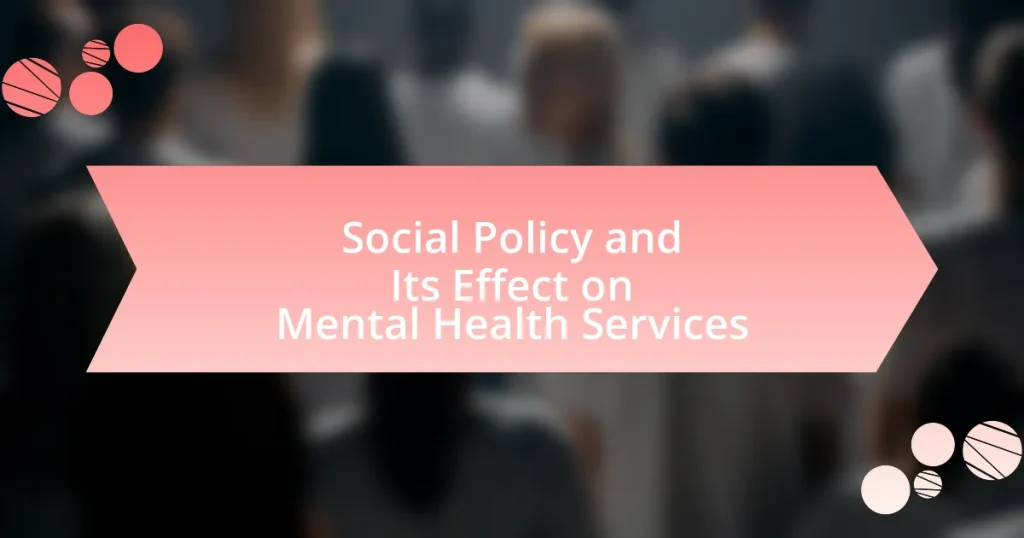The article examines the critical relationship between social policy and mental health services, highlighting how social policies influence accessibility, quality, and funding of mental health care. It discusses key components such as funding, legislation, and integration of services, and their impact on service availability and public perceptions of mental health. The article also addresses the effects of healthcare reforms, social welfare policies, and the challenges faced in implementing effective mental health support. Strategies for improving social policy outcomes and advocating for better mental health services are also outlined, emphasizing the importance of stakeholder engagement and data-driven approaches.

What is the relationship between social policy and mental health services?
The relationship between social policy and mental health services is that social policy directly influences the accessibility, quality, and funding of mental health services. Social policies shape the frameworks within which mental health services operate, determining how resources are allocated, which populations are prioritized, and the overall approach to mental health care. For instance, policies that promote mental health awareness and funding for community-based services can lead to improved access and outcomes for individuals with mental health conditions. Research indicates that countries with comprehensive mental health policies, such as the World Health Organization’s Mental Health Action Plan, experience better integration of mental health services into primary care, resulting in enhanced service delivery and reduced stigma.
How do social policies influence the availability of mental health services?
Social policies significantly influence the availability of mental health services by determining funding levels, access regulations, and service delivery models. For instance, policies that allocate increased funding for mental health initiatives can lead to the establishment of more clinics and programs, thereby enhancing service availability. According to the National Alliance on Mental Illness, states that expanded Medicaid under the Affordable Care Act saw a 30% increase in mental health service utilization, demonstrating how policy changes can directly impact service access. Additionally, social policies that promote integrated care models encourage collaboration between mental health and primary care services, further improving accessibility for individuals in need.
What are the key components of social policy that affect mental health services?
The key components of social policy that affect mental health services include funding, accessibility, legislation, and integration of services. Funding determines the resources available for mental health programs, influencing the quality and quantity of services provided. Accessibility ensures that individuals can obtain necessary mental health care without barriers, such as cost or location. Legislation establishes the legal framework that protects the rights of individuals with mental health conditions and mandates the provision of services. Integration of services promotes a holistic approach by coordinating mental health care with other health and social services, enhancing overall effectiveness. These components collectively shape the landscape of mental health services, impacting their delivery and effectiveness.
How do funding and resource allocation in social policy impact mental health services?
Funding and resource allocation in social policy significantly impact mental health services by determining the availability and quality of care provided to individuals. Adequate funding allows for the hiring of qualified professionals, the development of comprehensive treatment programs, and the provision of necessary resources such as facilities and technology. For instance, a study by the National Alliance on Mental Illness (NAMI) found that states with higher mental health funding reported better access to services and improved patient outcomes. Conversely, insufficient funding leads to understaffed facilities, longer wait times, and limited treatment options, ultimately compromising the effectiveness of mental health services. Therefore, the allocation of resources directly influences the capacity of mental health systems to meet the needs of the population.
Why is social policy important for mental health service delivery?
Social policy is crucial for mental health service delivery because it establishes the framework for access, funding, and quality of care. Effective social policies ensure that mental health services are integrated into the broader healthcare system, promoting equitable access for all individuals, regardless of socioeconomic status. For instance, the World Health Organization emphasizes that comprehensive mental health policies can lead to improved health outcomes and reduced stigma, which are essential for encouraging individuals to seek help. Additionally, policies that allocate resources for mental health initiatives can significantly enhance service availability and support community-based care, ultimately leading to better mental health outcomes.
What role does social policy play in shaping public perceptions of mental health?
Social policy significantly influences public perceptions of mental health by establishing frameworks that define mental health issues and guide societal attitudes. For instance, policies that promote mental health awareness and education can reduce stigma, as evidenced by initiatives like the National Alliance on Mental Illness’s “In Our Own Voice” program, which has been shown to improve understanding and acceptance of mental health conditions. Furthermore, social policies that allocate funding for mental health services can enhance visibility and normalize discussions around mental health, leading to a more informed public. Research indicates that countries with comprehensive mental health policies, such as those in Scandinavia, report lower stigma levels and higher public support for mental health initiatives, demonstrating the direct correlation between social policy and public perception.
How does social policy address stigma associated with mental health issues?
Social policy addresses stigma associated with mental health issues through legislation, public awareness campaigns, and integration of mental health services into general healthcare. Legislation, such as the Mental Health Parity and Addiction Equity Act, mandates equal treatment for mental health conditions, thereby reducing discrimination. Public awareness campaigns, like the National Alliance on Mental Illness’s “You Are Not Alone,” aim to educate the public and promote understanding, which has been shown to decrease stigma. Additionally, integrating mental health services into primary care settings normalizes mental health treatment, making it more accessible and reducing the perception of mental health issues as separate or shameful. These strategies collectively contribute to a societal shift towards acceptance and support for individuals with mental health challenges.

What are the effects of specific social policies on mental health services?
Specific social policies significantly influence mental health services by shaping funding, accessibility, and quality of care. For instance, the implementation of the Affordable Care Act in the United States expanded mental health coverage, leading to a 30% increase in the number of individuals receiving mental health services between 2010 and 2018. Additionally, policies promoting integrated care models have improved coordination between mental health and primary care, enhancing patient outcomes. Research indicates that countries with comprehensive mental health policies, such as those in Scandinavia, report lower rates of mental illness and higher satisfaction with mental health services, demonstrating the positive impact of well-structured social policies on mental health care systems.
How do healthcare reforms impact mental health service accessibility?
Healthcare reforms significantly enhance mental health service accessibility by expanding insurance coverage and integrating mental health into primary care. For instance, the Affordable Care Act in the United States mandated that mental health services be included in essential health benefits, leading to an increase in the number of individuals with access to mental health care. According to a study published in Health Affairs, states that expanded Medicaid saw a 30% increase in mental health service utilization among low-income populations. This integration reduces stigma and encourages individuals to seek help, thereby improving overall mental health outcomes.
What changes have been made in mental health services due to recent healthcare reforms?
Recent healthcare reforms have led to increased funding and accessibility for mental health services. Specifically, reforms have expanded insurance coverage for mental health treatment, ensuring parity with physical health services, which has resulted in a significant rise in the number of individuals receiving care. According to the National Alliance on Mental Illness, approximately 1 in 5 adults in the U.S. experience mental illness, and reforms have aimed to reduce barriers such as high out-of-pocket costs and limited provider networks. Additionally, there has been a push for integrating mental health services into primary care settings, enhancing early intervention and reducing stigma associated with seeking help. These changes reflect a broader commitment to improving mental health outcomes through policy adjustments that prioritize mental health as a critical component of overall health care.
How do these reforms affect different populations in need of mental health services?
These reforms significantly impact various populations in need of mental health services by increasing access, improving quality of care, and addressing disparities. For instance, low-income individuals often benefit from expanded Medicaid coverage, which allows them to access mental health services that were previously unaffordable. Additionally, reforms that promote integrated care models enhance service delivery for those with co-occurring mental health and substance use disorders, leading to better health outcomes. Research indicates that minority populations experience reduced barriers to care through targeted outreach and culturally competent services, which are often included in reform initiatives. These changes collectively aim to create a more equitable mental health system, addressing the unique needs of diverse groups.
What is the impact of social welfare policies on mental health services?
Social welfare policies significantly enhance mental health services by providing funding, access, and support for individuals in need. These policies often allocate resources to mental health programs, ensuring that services are available to underserved populations. For instance, the expansion of Medicaid under the Affordable Care Act in the United States increased access to mental health care for millions, demonstrating a direct correlation between social welfare initiatives and improved mental health service utilization. Studies indicate that regions with robust social welfare policies report lower rates of mental health issues, highlighting the effectiveness of such policies in promoting mental well-being.
How do social welfare programs support individuals with mental health conditions?
Social welfare programs support individuals with mental health conditions by providing access to essential services, financial assistance, and community resources. These programs often include mental health treatment coverage, which allows individuals to receive therapy and medication management without prohibitive costs. For example, the Medicaid program in the United States covers a range of mental health services, ensuring that low-income individuals can access necessary care. Additionally, social welfare initiatives may offer housing support, job training, and social services that help individuals maintain stability and improve their overall quality of life. Research indicates that access to these resources significantly reduces symptoms of mental health conditions and enhances recovery outcomes, demonstrating the critical role of social welfare programs in supporting this vulnerable population.
What challenges do social welfare policies face in providing mental health support?
Social welfare policies face significant challenges in providing mental health support, primarily due to inadequate funding and resource allocation. Many mental health programs are underfunded, leading to insufficient services and long wait times for individuals seeking help. For instance, a report from the National Alliance on Mental Illness indicates that nearly 60% of adults with mental illness did not receive mental health services in the previous year, highlighting the gap in access to care. Additionally, social stigma surrounding mental health issues often discourages individuals from seeking support, further complicating the effectiveness of these policies. Furthermore, the lack of trained mental health professionals exacerbates the situation, as there are often not enough qualified providers to meet the demand for services. These factors collectively hinder the ability of social welfare policies to effectively address mental health needs within communities.

How can social policy be improved to enhance mental health services?
Social policy can be improved to enhance mental health services by increasing funding for mental health programs and integrating mental health care into primary health care systems. Increased funding allows for the expansion of services, hiring of qualified professionals, and development of community-based programs that address mental health needs. For instance, the National Alliance on Mental Illness reports that states with higher mental health funding have better access to care and improved outcomes for individuals with mental health conditions. Additionally, integrating mental health care into primary health care can reduce stigma and improve access, as evidenced by studies showing that patients are more likely to seek help when mental health services are part of their regular health care.
What best practices can be adopted in social policy to support mental health services?
Best practices in social policy to support mental health services include integrating mental health into primary healthcare, ensuring adequate funding for mental health programs, and promoting public awareness campaigns. Integrating mental health into primary healthcare allows for early identification and treatment of mental health issues, which can reduce the overall burden on healthcare systems. Adequate funding is crucial, as studies show that countries with higher investment in mental health services experience better health outcomes and reduced healthcare costs. Public awareness campaigns can destigmatize mental health issues, encouraging individuals to seek help and improving overall community mental health. For example, the World Health Organization emphasizes that comprehensive mental health policies can lead to significant improvements in mental health service delivery and accessibility.
How can stakeholder engagement improve social policy outcomes for mental health?
Stakeholder engagement can significantly improve social policy outcomes for mental health by ensuring that policies are informed by the needs and experiences of those directly affected. Engaging stakeholders, including individuals with lived experience, healthcare providers, and community organizations, leads to more relevant and effective mental health services. For instance, research by the World Health Organization indicates that involving stakeholders in policy development results in higher satisfaction rates and better health outcomes, as policies are tailored to address specific community needs. This collaborative approach fosters trust, enhances transparency, and encourages the allocation of resources to areas that stakeholders identify as priorities, ultimately leading to improved mental health services and outcomes.
What role does data and research play in informing better social policies for mental health?
Data and research are critical in shaping effective social policies for mental health by providing evidence-based insights into the prevalence, causes, and impacts of mental health issues. These insights enable policymakers to identify specific needs within populations, allocate resources efficiently, and design targeted interventions. For instance, the World Health Organization reports that mental health disorders account for 13% of the global burden of disease, highlighting the necessity for data-driven policies that address this significant public health challenge. Additionally, research studies, such as those published in the Lancet Psychiatry, demonstrate that early intervention and community-based services can reduce long-term costs and improve outcomes, reinforcing the importance of using empirical evidence to guide policy decisions.
What are the common barriers to effective social policy implementation in mental health services?
Common barriers to effective social policy implementation in mental health services include inadequate funding, lack of trained personnel, and insufficient coordination among agencies. Inadequate funding limits the resources available for mental health programs, leading to reduced service availability and quality. The lack of trained personnel results in a workforce that is unable to meet the diverse needs of individuals with mental health issues, which can hinder service delivery. Additionally, insufficient coordination among various health and social service agencies creates fragmentation, making it difficult for individuals to access comprehensive care. These barriers collectively impede the successful implementation of social policies aimed at improving mental health services.
How do political and economic factors hinder the effectiveness of mental health policies?
Political and economic factors significantly hinder the effectiveness of mental health policies by limiting funding, creating bureaucratic obstacles, and influencing public perception. Insufficient government funding leads to inadequate resources for mental health services, resulting in long wait times and reduced access to care. For example, a study by the National Alliance on Mental Illness found that states with lower mental health funding have higher rates of unmet needs among individuals with mental health conditions. Additionally, political agendas can prioritize other issues over mental health, causing policies to lack comprehensive support. Economic downturns further exacerbate these challenges, as budget cuts often target mental health programs, diminishing their capacity to provide essential services. Consequently, these intertwined political and economic factors create an environment where mental health policies struggle to achieve their intended outcomes.
What strategies can be employed to overcome these barriers?
To overcome barriers in mental health services influenced by social policy, strategies such as increasing funding for mental health programs, enhancing public awareness campaigns, and implementing integrated care models can be employed. Increased funding allows for the expansion of services and resources, addressing the shortage of mental health professionals. Public awareness campaigns can reduce stigma and encourage individuals to seek help, as evidenced by studies showing that stigma reduction correlates with increased service utilization. Integrated care models, which combine mental health services with primary care, improve access and coordination of care, leading to better health outcomes.
What practical steps can be taken to advocate for better social policies in mental health?
To advocate for better social policies in mental health, individuals and organizations can engage in several practical steps. First, they can conduct research to gather data on mental health issues and the effectiveness of existing policies, which can inform advocacy efforts. For instance, studies have shown that countries with comprehensive mental health policies experience better health outcomes, highlighting the need for effective advocacy.
Second, stakeholders can form coalitions with mental health professionals, patients, and community organizations to amplify their voices and create a unified front. Collaborative efforts can lead to more significant influence on policymakers.
Third, advocacy campaigns can be launched to raise public awareness about mental health issues and the importance of policy reform. Campaigns that utilize social media have proven effective in mobilizing support and educating the public, as seen in initiatives like Mental Health Awareness Month.
Fourth, engaging directly with policymakers through meetings, public hearings, and written communications can help convey the urgency of mental health needs and the necessity for policy changes. Evidence from advocacy groups indicates that direct engagement often leads to more responsive policymaking.
Lastly, individuals can participate in or support grassroots movements that push for legislative changes, as these movements have historically been instrumental in enacting significant policy reforms in various sectors, including mental health.
